|
|
|
Sort Order |
|
|
|
Items / Page
|
|
|
|
|
|
|
| Srl | Item |
| 1 |
ID:
100729
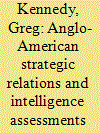

|
|
|
|
|
| Publication |
2010.
|
| Summary/Abstract |
The historiography of Western intelligence assessments of Japanese military power and prowess, particularly before the Pearl Harbor attack in December 1941, is littered with accusations of racism, ignorance, arrogance, and incompetence, which are portrayed as having created one of the most serious underestimations of a modern power's military capabilities. However, cultural and racial biases will always exist in professional military establishments because their competitiveness and emphasis on morale lead some untrained minds to undervalue systems possessing values different from their own. This article will reassess the influences of racism on Anglo-American appreciations of Japanese air power, and its development, in the seven years before the attack on Pearl Harbor.
|
|
|
|
|
|
|
|
|
|
|
|
|
|
|
|
| 2 |
ID:
127889
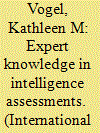

|
|
|
|
|
| Publication |
2013.
|
| Summary/Abstract |
In 2011, scientists in the Netherlands and Japan announced that they had created a modified variant of the H5N1 avian influenza virus that was transmissible via aerosol, raising fears of a new, highly lethal H5N1 virus that could cause a deadly global pandemic. Soon, government officials and the media were raising alarms about the wisdom of publishing such experimental methods and results in the open scientific literature. Their concerns sparked a large public controversy about the H5N1 experiments and their potential publication. In the midst of this controversy, U.S. intelligence analysts began assessing the potential security implications of the H5N1 manuscripts, including whether a terrorist, criminal, or state could easily replicate these experiments and create mutated viruses for bioweapons use. An in-depth look at this controversy reveals that, first, U.S. intelligence analysts do not have adequate social and material resources to identify and evaluate the tacit knowledge, or know-how, that underpins dual-use experiments such as those in the H5N1 case. Second, they lack dedicated structures and methods to understand the politics that characterize the use of technical expertise in such controversial biosecurity issues. Third, they require new types, structures, and uses of expert knowledge to enable them to make more informed and balanced assessments of biosecurity threats.
|
|
|
|
|
|
|
|
|
|
|
|
|
|
|
|
| 3 |
ID:
114250
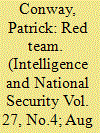

|
|
|
|
|
| Publication |
2012.
|
| Summary/Abstract |
This article explains how flawed intelligence assessments of Iraq's aluminum tubes became 'Exhibit A' in the Bush administration's case for the Iraq War. The assessments seem to have begun as a consequence of a debate within the administration over US Iraq policy in early 2001. The neoconservatives wanted intelligence that would help them argue for regime-change. A WINPAC 'Red Team' analyst analyzed the tubes using the same methodology as 1976's infamous Team B panel, which skewed intelligence to support neoconservative policies. The Red Team analyst erroneously concluded the tubes were for a nuclear program thus countering assessments that they had a non-nuclear purpose. After the attacks of September 11 and President Bush's embrace of regime-change, the Red Team tubes assessment began to become the official position of the Intelligence Community. In September 2002, the President cited the assessment publicly, forcing the Intelligence Community to adopt it as the majority position in the Iraq NIE. 'Exhibit A' in the case for war was thus the product of a Red Team and, as such, was essentially propaganda masquerading as intelligence.
|
|
|
|
|
|
|
|
|
|
|
|
|
|
|
|
| 4 |
ID:
113409
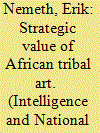

|
|
|
|
|
| Publication |
2012.
|
| Summary/Abstract |
Military engagement of insurgents risks destruction of religious monuments and historic structures, and political and economic instability that follows armed conflict enables looting of antiquities. In combination, threats to cultural structures and movable cultural patrimony compromise cultural security. This article explores the potential of the art market for open-source intelligence assessments of cultural security. A comparison of the market value of artifacts of different ethnic origins provides a measure of the risk of looting of cultural patrimony by geographic region. Intelligence assessments of the relative desirability of cultural artifacts by region of origin can inform strategic planning to mitigate looting in conflict zones and to alert security services to emerging threats of trafficking in cultural patrimony.
|
|
|
|
|
|
|
|
|
|
|
|
|
|
|
|
| 5 |
ID:
163355
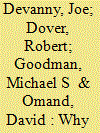

|
|
|
|
|
| Summary/Abstract |
In this article, Joe Devanny, Robert Dover, Michael S Goodman and David Omand explore the current problems facing intelligence analysis and analysts in the UK and consider what might be done to tackle them. They argue that nothing less than a revolution in the British government’s approach to intelligence assessment is required and that this ought to take the form of a School of Intelligence Assessment within a properly financed and structured National Security Academy.
|
|
|
|
|
|
|
|
|
|
|
|
|
|
|
|
|
|
|
|
|